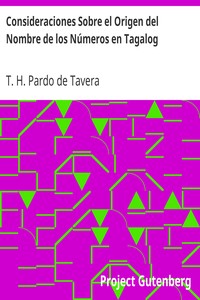| Author |
Pardo de Tavera, T. H. (Trinidad Hermenegildo), 1857-1925 |
| LoC No. |
12028334
|
| Title |
Consideraciones Sobre el Origen del Nombre de los Números en Tagalog
|
| Credits |
Produced by Tamiko I. Camacho, Pilar Somoza and PG Distributed
Proofreaders from page scans provided by University of Michigan.
|
| Summary |
"Consideraciones Sobre el Origen del Nombre de los Números en Tagalog" by Don T. H. Pardo de Tavera is a scholarly publication written in the late 19th century. This work focuses on the linguistic origins and meanings of the names of numbers in the Tagalog language, providing insights into their historical and etymological roots, especially in the context of related languages within the Austronesian family. In this book, Pardo de Tavera conducts an exploration into the words used for numbers in Tagalog, tracing their origins back to other Austronesian languages and even suggesting connections to non-native languages like Arabic and Sanskrit. He argues that the Tagalog numbering system has evolved from more basic forms of counting, grounded in physical objects and concepts like the hand. Through detailed analysis, he illustrates how numbers like 'five' (limá) directly correlate not only to the count of fingers but also to ancient linguistic roots and societal needs for quantification. By delving deep into the meanings and uses of numerical terms, the author lays the groundwork for future linguistic studies on this topic, recognizing both the simplicity and complexity of numerical representation in human culture. (This is an automatically generated summary.)
|
| Language |
Spanish |
| LoC Class |
DS: History: General and Eastern Hemisphere: Asia
|
| LoC Class |
PL: Language and Literatures: Languages and literatures of Eastern Asia, Africa, Oceania
|
| Subject |
Tagalog language -- Numerals
|
| Category |
Text |
| EBook-No. |
15757 |
| Release Date |
May 3, 2005 |
| Most Recently Updated |
Dec 14, 2020 |
| Copyright Status |
Public domain in the USA. |
| Downloads |
70 downloads in the last 30 days. |
|
Project Gutenberg eBooks are always free!
|

